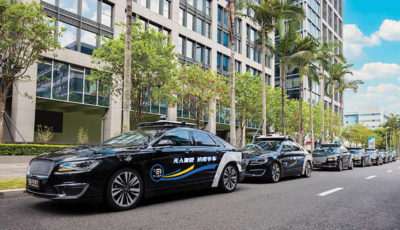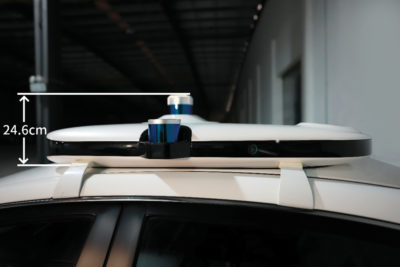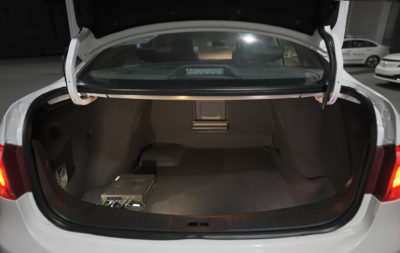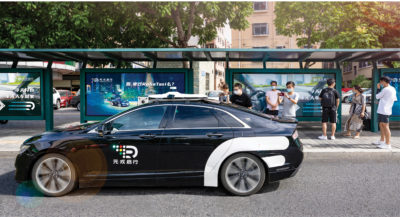
Robotaxi in the busy downtown of Shenzhen, Guangdong, China. The DeepRoute rooftop box is clearly visible
Since LIDAR Magazine spoke with DeepRoute VP Nianqiu Liu in July 20201, the company has deployed robotaxis in Wuhan and Shenzhen, and received a Drivered Autonomous Vehicle permit from the California Public Utilities Commission. After receiving a CES Innovation Award last year for its unique combination of software and sensing solutions, the company showcased its DeepRoute-Engine at CES 2021. DeepRoute is also a member of Nvidia’s Inception Program. The company’s research has resulted in a number of published papers, including recent contributions on motion forecasting2 and point-cloud segmentation3.
DeepRoute has been testing autonomous vehicles on public roads since early 2019. In less than two years, road tests have taken place in Shenzhen, Wuhan, and Hangzhou, using Lincoln MKZ, Dongfeng E70, and Geely Geometry A. The testing in Wuhan is based on the RoboTaxi partnership with Dongfeng Motors, and the one in Hangzhou is based on the RoboTaxi partnership with Cao Cao Mobility, a ride-hailing company backed by Geely. The project in Shenzhen is DeepRoute’s own. The different characteristics of the three cities bring diversity to the data, allowing us to advance our technology more efficiently.
This year DeepRoute-equipped robotaxis are operating in the busy downtown streets of Shenzhen and over 10,000 customer applications were received in one month to test the new technology. Citizens in Shenzhen, the Silicon Valley of China, are definitely curious and quick to embrace the new trend. During an outbreak of Covid-19 in June in Guangzhou province, DeepRoute.ai took the initiative to contact local government. DeepRoute dispatched robotaxis to deliver Covid-19 test samples to hospitals. The robotaxis were on standby 24/7 and delivered over 14,000 test samples per day. DeepRoute and the robotaxi operators are considering expanding the robotaxi fleet for daily operations to accommodate increasing interest. Thanks to recent Series B funding, DeepRoute aims to scale up its own fleet, as well as collaborating with automakers, to over 150 robotaxis in the coming months, operating in the central business district to make robotaxi service more accessible to the general public. Offering more robotaxis in the three cities would provide more case studies under complex road situations, thus increasing data efficiency.
Originally there were separate suppliers for lidar, radar, cameras, GNSS receivers, IMUs, and the task of integrating these technologies would be left to vehicle manufacturers, but, as of 2021, DeepRoute has produced ready-to-go self-driving solutions that can be mounted on cars from many automakers.
DeepRoute, an international providers of full-stack, Level 4 self-driving solutions, is using its award-winning, innovative sensor technology to solve the engineering challenge of safe and affordable self-driving. Currently partnering with automotive OEMs, Tier 1 suppliers, mobility technology providers, and transportation and logistics companies, DeepRoute offers products and services that allow its clients to begin testing the self-driving technology on their vehicles immediately, and open up a wealth of opportunities for the future of transportation.
With the option to implement a full-stack solution, or individual modules such as high-accuracy perception, DeepRoute’s highly customizable services allow for greater innovation in alternative forms of transportation moving forward. Depending on a client’s requirements, DeepRoute can select and combine multiple brands of lidars, with the goals of optimizing performance and lowering costs.
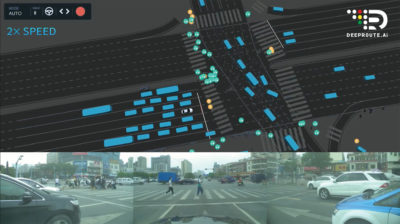
DeepRoute.ai visualizer showing robotaxi perception at crossroads in the Futian central business district, Shenzhen.
DeepRoute’s lidar tests measure a number of vital components, including frame rate, frequency, field of view, horizontal angular resolution, vertical angular resolution, ranging capability and accuracy, while DeepRoute’s performance simulations test the stability, power consumption, and detection efficiency, to determine the best solution while maintaining affordability. DeepRoute currently tests and utilizes a number of brands, such as Hesai, Innoviz, Ouster, RoboSense and Velodyne.
The company’s sensing solution, DeepRoute-Sense, includes a slim vehicle rooftop box and advanced sensor fusion calibration service. Only 9.6″ high, the box contains seven vehicle cameras, three lidars, GNSS, among other sensors, and the corresponding telecommunications and data synchronization controllers. Using machine learning and heuristic algorithms, the system can identify and predict the actions of surrounding objects in a range of 150 m, while its vehicle camera, DeepRoute-Vision, allows for optimal detection performance while also avoiding overexposure. The highly precise system can reduce the impact of rain, fog, dust, and direct sunlight using automatic image adjustment and fine LED flicker-resistance, allowing vehicles to drive safely in extreme conditions.
Since its announcement of over one million miles driven in challenging city streets around the world without accidents4, DeepRoute has further improved its algorithms and, indeed, the company has now topped two million kilometers. Deep learning plays an important role in its software development, providing key information for DeepRoute’s planning and control modules. Inaccurate detections could lead to safety issues on the road, which is why the use of multiple sensors is critical. DeepRoute-Syntric, which is DeepRoute’s data-synchronization device, can also monitor the status of hardware, sensors included, to command the vehicle to stop when not operating properly. Ranking highly on the KITTI and Semantic KITTI tests, DeepRoute’s perception algorithm fuses the data before inference, which makes the detection result more reliable.
DeepRoute’s independently developed inference engine minimizes the computing resources required, making it possible to lower the power consumption of computing platforms using different brands, such as AMD, Intel, and Nvidia. The data collected by the various sensors is calibrated using a controller, while DeepRoute-Syntric calibrates the time and space information. The company ultimately finds success in the connection of its range of sensors, in terms of both hardware, which entails the rooftop box, in-car components, and the associated cabling and wireless connections, and software.
DeepRoute-Tite is a 100-watt computing platform that serves as the brain of the self-driving system. Utilizing a powerful inference engine and deep learning models, DeepRoute-Tite is extremely power-efficient, requiring only about 11% of traditional solutions’ power consumption. It also minimizes the amount of computation required to output useful data, shortening decision-making time to offer a smooth ride experience. Additionally, its compact size also saves much room in the trunk.
DeepRoute, therefore, has established a reputation for innovation and the ability to use sensors from multiple providers. Its success in long-term trials suggests that the company will have a strong future.
Victor Wong is a hardware engineer at DeepRoute.ai’s headquarters in Shenzhen, Guangdong, China.
1 Walker, A.S., 2020. AV lidar needs software too, LIDAR Magazine, 10(5): 40-45, October/November 2020.
2 Ye, M., T. Cao and Q. Chen, 2021. TPCN: Temporal Point Cloud Networks for motion forecasting, CVPR 2021, 11318-11327.
3 Ye, M., S. Xu, T. Cao and Q. Chen, 2021. DRINet: a Dual-Representation Iterative Learning Network for point cloud segmentation, International Conference on Computer Vision (ICCV), 2021, 10 pp.
